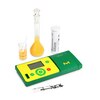QIA76 Sigma-AldrichLive/Dead Double Staining Kit
Recommended Products
Overview
| Replacement Information |
|---|
Key Spec Table
| Detection Methods |
|---|
| Fluorescence |
| References | |
|---|---|
| References | Luther, E., and Kamenstsky, L.A. 1996. Cytometry 23, 272. Frey. T., et al. 1995. Cytometry 21, 265. |
| Product Information | |
|---|---|
| Detection method | Fluorescence |
| Form | 100 Tests |
| Format | Fluorescence microscopy |
| Kit contains | Staining Buffer, Cyto-Dye, Propidium Iodide, and a user protocol. |
| Quality Level | MQ100 |
| Applications |
|---|
| Biological Information | |
|---|---|
| Assay time | 0.5 h |
| Sample Type | Cell suspensions or adherent cells |
| Species Reactivity |
|
| Physicochemical Information |
|---|
| Dimensions |
|---|
| Materials Information |
|---|
| Toxicological Information |
|---|
| Safety Information according to GHS |
|---|
| Packaging Information |
|---|
| Transport Information |
|---|
| Supplemental Information | |
|---|---|
| Kit contains | Staining Buffer, Cyto-Dye, Propidium Iodide, and a user protocol. |
| Specifications |
|---|
| Global Trade Item Number | |
|---|---|
| Catalogue Number | GTIN |
| QIA76 | 0 |
Documentation
Live/Dead Double Staining Kit SDS
| Title |
|---|
Live/Dead Double Staining Kit Certificates of Analysis
| Title | Lot Number |
|---|---|
| QIA76 |
References
| Reference overview |
|---|
| Luther, E., and Kamenstsky, L.A. 1996. Cytometry 23, 272. Frey. T., et al. 1995. Cytometry 21, 265. |













